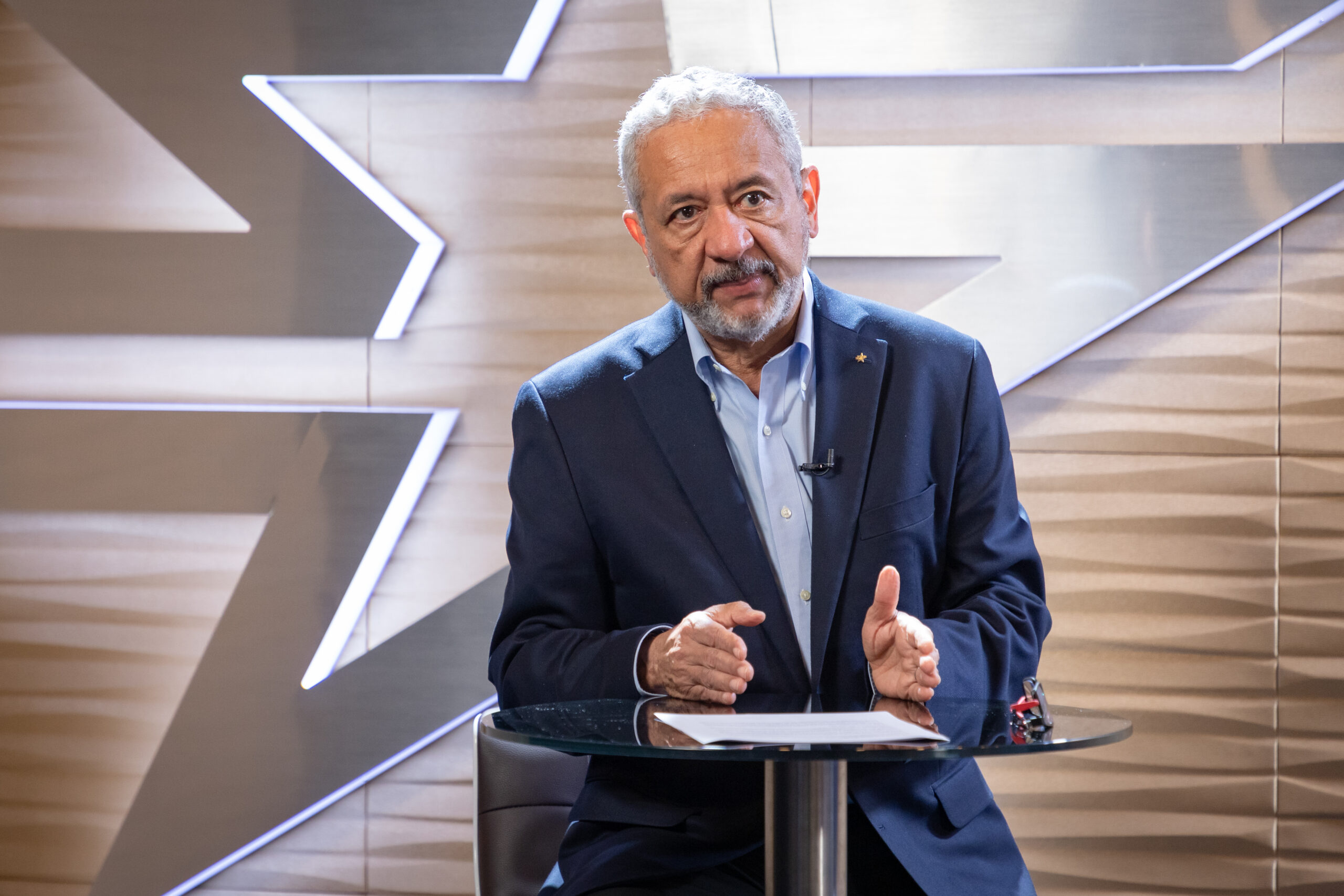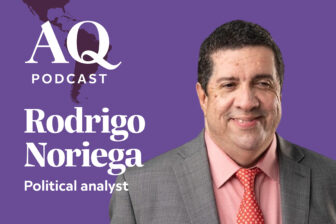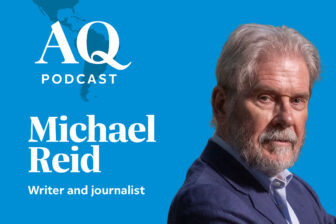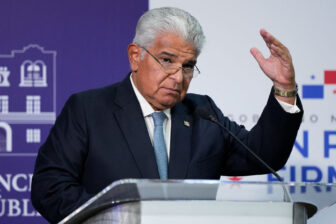It hasn’t been an easy era to run the Panama Canal.
Even before President Donald Trump’s talk of “taking the canal back” for the United States began in December, the key waterway was hit by a severe drought in 2022-24 that slowed traffic, caused fees to spike and prompted many shipping companies to seek alternate routes.
Panamanian economist Ricaurte Vásquez Morales has been the administrator of the Panama Canal Authority, which oversees the canal, since 2019. In conversation with AQ Editor-in-Chief Brian Winter, he discussed Trump’s recent statements regarding the canal, efforts to expand infrastructure including a potential new gas pipeline, and the possible long-term implications if a melting Arctic opens up new shipping routes.
The following interview has been edited for length and clarity.
BW: You have been at the epicenter of a storm since December. What has it been like for people who work inside the canal?
Vásquez: Well, at times fear, at times disappointment. I think in general terms, there are people who prefer not to voice their opinions, but over the last few weeks, I think they are becoming more forceful and saying: “You know, this is ours. We fought for (the canal) and we have run it very well.”
In the long-term relationship that Panama has had with the U.S., there have been ups and downs. Most of the time, the people that work here … associate values and respect of law and other elements to be very much embedded in the American DNA. What is happening right now comes first with disbelief. We do not understand.
BW: The Panamanian government has taken several steps to try to address the U.S. government’s concerns about several issues, including the Chinese ownership of ports on either side of the canal. President Trump, however, continues to say that he wants the canal back. Do you take him literally?
Vásquez: The first issue I see is what is his definition of the canal, and what is our definition. When we listen to the talk about ports and other facilities, that is not part of the Panama Canal.
BW: In what you define as the canal itself, is there any Chinese presence?
Vásquez: Absolutely not. Neither Chinese nor anyone else. The canal is, per our constitution, run by Panamanians. We have created provisions here in Panama to keep the Panama Canal away from electoral politics. And we are about to go to the third generation of (improvements to the canal), trying to be even more important to the world, by making sure that we have enough water to ensure that this rain-dependent canal remains very reliable for world trade.
BW: Do you understand the Trump administration’s concerns, which were also shared by some members of the U.S. defense community under the Biden administration, about the Chinese presence near the canal?
Vásquez: I think it is a fact that there is a commercial Chinese entity that operates the terminal ports in Balboa and Cristóbal. To go from that fact into saying it can be used for military purposes—for intelligence gathering information and the like—that is still to be demonstrated … and that’s why I believe it is so important to have a conversation, if the counterpart is willing to listen.
BW: In the 1970s, prior to the signing of the canal treaty, there was a belief in the United States that the canal would be more secure in Panamanian hands. Henry Kissinger believed this. Not only because of the risk of social unrest in Panama, as there had been against the U.S. presence in the 1960s, but also because it would make the canal neutral in any global conflict. Do you think today that the canal is safer in Panamanian hands?
Vásquez: I believe so. It’s clear that the realities of the 70s were different. That being said, this is a small country that is highly dependent on the canal. To Panama and to Panamanians, the canal is fundamental for the well-being of the country. It is clear that Panamanians will protect the canal, will avoid conflict.
The treaties provided many elements. There was a lingering responsibility for the U.S. to help protect the Panama Canal. So, I think they struck a magical balance between presence, security and ownership. Since the Panama Canal was transferred, there is not a single case where Panama failed to perform under the terms of the law and the treaties.
BW: Panama has invested billions of dollars in the canal over the last 20 years. I first toured the canal in 2004, before the expansion, and I’ve seen how it has grown. There are now about $8 billion in infrastructure and sustainability projects earmarked for the next decade. How would these new projects change the canal?
Vásquez: One (to build a new reservoir) will enhance reliability because in the end we are a freshwater canal. We had never gotten to the extremes of drought we experienced two years ago, but it’s something we have to anticipate could happen again in the future. That’s moving and moving relatively fast.
The other thing is how we generate capacity to move more tradables through. Using Panama’s geographical position, which we have used as a natural resource for 500 years. From the Spanish conquista, to the Gold Rush, to Alaskan crude, to today. What are we seeing now in the market? The U.S. is becoming one of the largest energy product exporters in the world. And some of the markets are trans-Pacific. And who’s in the middle?
To the U.S., Panama is a bargain because it’s Panama who is making the $8 billion investment that is required to assure that these tradables end up in the proper markets at the right cost.
BW: You’re referring to plans for a gas pipeline.
Vásquez: LPG (liquified petroleum gas) will be probably the most likely product and it could grow into something different, in the same way we have expanded the canal. In addition to moving vessels, we can use our geography to move specific cargoes. There are port facilities in the U.S. that cannot handle some of the vessels that we transit through the Panama Canal. So there is a lack of infrastructure in the U.S. to receive those vessels.
And here is Panama with 4 million people and a very small economy that is very heavily dependent on international trade, making the capital investments that are required in order for those trade flows to continue to be uninterrupted, and to be moved in the most efficient way.
BW: What are the investments that need to be made in terms of improving security? President Mulino recently convened a meeting saying that there was room for improvement on the security side. What is it that needs to be improved?
Vásquez: There is an issue of immigration in the States. The government of Panama has come forward in trying to be instrumental in helping on that issue. There are issues related to organized crime, to drug trafficking. Those are realities that we are ready to work on, together with the U.S. and other entities around the world. It’s not good for Panama’s business reputation. It’s not good for the Panama’s reputation as a whole.
BW: Have you, in your position, given any thought to what might happen if, or when, the Arctic continues to melt and the northern route becomes more viable for shipping?
Vásquez: We do not believe that we are a monopoly. Far from it. My generation understands that there is competition.
We follow what is happening in the Arctic, and we are concerned. That is a complicated proposition, and not just because it’s environmentally complicated in terms of sustainability. You can have a meltdown and then a freeze-up. But the other element is the Panama Canal is under Panama’s control and no one else’s. When you look at the Arctic and you complain about X, Y, and Z countries’ influence on the waterway, the Arctic is an invitation to many countries to try to influence what happens. So just from the political standpoint, (rather than) getting all these countries together and agreeing on how to operate the northern passage … It is a lot simpler to just make an agreement with Panama.









